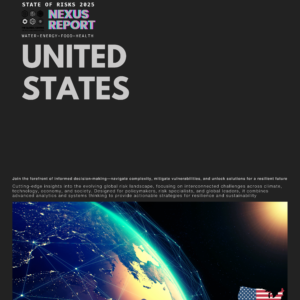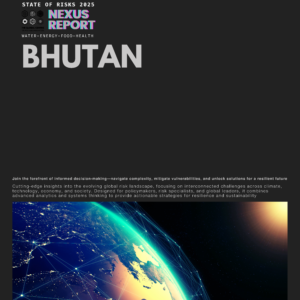State of Risks: Transportation and Logistics (Print)
Nexus Reports offer a holistic approach to tackling challenges in the Transportation and Logistics sector, integrating real-time data, advanced analytics, and sustainability-focused strategies. By addressing the water, energy, food, and health nexus, these reports empower companies to improve operational efficiency, build resilience, and drive innovation in a complex, interconnected world.
Transform Transportation. Enhance Resilience. Drive Sustainable Logistics.
$1,250.00
Nexus Reports provide the Transportation and Logistics sector with critical insights to address interconnected risks and enhance resilience. Focusing on the Water, Energy, Food, and Health Nexus, these reports equip transportation and logistics companies with actionable strategies to navigate challenges, ensure sustainability, and optimize the global movement of goods and people.
Key Features
- Integrated Risk Analysis: Explore how the interdependence of water, energy, food, and health impacts transportation systems, logistics operations, and supply chains, including resource availability and infrastructure resilience.
- Real-Time Data for Informed Decision-Making: Leverage IoT and AI-powered analytics to monitor emerging risks related to resource consumption, optimize routes, and improve operational efficiency.
- Infrastructure Resilience and Sustainability: Insights to enhance the resilience of transportation infrastructure against environmental challenges, ensuring continuity while minimizing ecological footprints.
- Sustainability-Driven Solutions: Guidance on implementing sustainable practices in transportation and logistics, reducing emissions, conserving resources, and aligning with ESG goals.
- Health and Safety Integration: Strategies to ensure the health and safety of passengers and staff, incorporating health considerations into operations and emergency response plans.
- Tailored Recommendations: Specific strategies for diverse transportation and logistics sectors to adapt to evolving risks at the nexus of water, energy, food, and health.
- Localized and Global Perspectives: Regional insights and global best practices tailored to unique markets and transportation ecosystems.
Who It’s For
- Airlines and Aviation Services: Fuel efficiency, emission reductions, passenger health safety, and efficient resource management. Strategies for optimizing flight routes to save fuel, implementing health protocols, and adopting sustainable aviation fuels.
- Airports and Ground Handling Services: Infrastructure resilience, energy management, water usage, and health security. Guidance on sustainable airport operations, energy-efficient facilities, water conservation techniques, and health screening processes.
- Shipping and Maritime Transport: Fuel consumption, compliance with environmental regulations, and supply chain resilience. Insights into optimizing shipping routes, adopting cleaner fuels, managing ballast water, and ensuring supply chain continuity.
- Railways and Public Transit Systems: Energy efficiency, passenger health, and sustainable infrastructure. Recommendations for energy-efficient technologies, implementing health measures, and integrating renewable energy sources.
- Logistics and Supply Chain Providers: Supply chain transparency, resource optimization, and risk mitigation. Tools for optimizing logistics networks, reducing energy consumption, and enhancing supply chain resilience against nexus-related disruptions.
- Automotive Manufacturing: Sustainable production, energy and water usage, and health and safety in manufacturing processes. Strategies for implementing green manufacturing practices, conserving resources, and ensuring worker health and safety.
- Electric and Autonomous Vehicle Companies: Battery sustainability, energy sourcing, and infrastructure integration. Insights into sustainable battery technologies, renewable energy integration, and infrastructure development for EVs.
- Freight Forwarding Firms: Efficient routing, compliance with environmental standards, and cargo safety. Guidance on route optimization, adopting sustainable practices, and ensuring the health and safety of goods transported.
- Infrastructure Development Companies: Sustainable design, resource-efficient construction, and resilience to environmental challenges. Recommendations for sustainable materials, energy-efficient designs, and resilient infrastructure planning.
- Port Authorities and Customs Management: Operational efficiency, environmental compliance, and health security. Strategies for port sustainability, waste and water management, and implementing health protocols for goods and personnel.
Why Nexus Reports?
Nexus Reports offer a holistic approach to tackling challenges in the Transportation and Logistics sector, integrating real-time data, advanced analytics, and sustainability-focused strategies. By addressing the water-energy-food-health nexus, these reports empower companies to improve operational efficiency, build resilience, and drive innovation in a complex, interconnected world.
Transform Transportation. Enhance Resilience. Drive Sustainable Logistics.
Discover more from Nexus Journals
Subscribe to get the latest posts sent to your email.








There are no reviews yet.